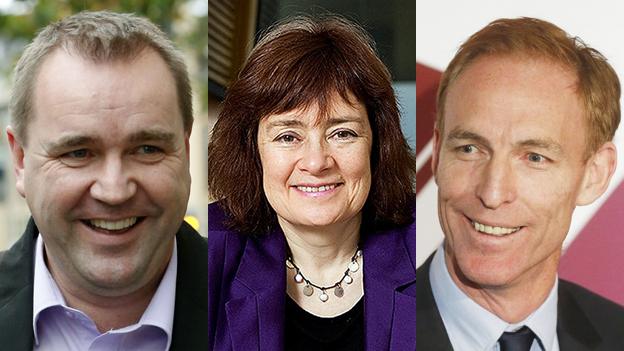Salmond: Labour 'will pay for a generation' for Conservative deal
- Published
Alex Salmond MSP said Labour will 'pay the price'
Labour in Scotland will pay the price for a generation for campaigning with the Conservatives in the independence referendum, Alex Salmond has predicted.
The outgoing first minister said there was "deep resentment" at the way Labour campaigned for a "No" vote
He told the BBC's Andrew Marr Show: "This is not going to be forgotten or forgiven for a generation."
Two polls have suggested Scottish Labour is on course to lose most of its Westminster seats to the SNP.
And the party is currently looking for a new Scottish leadership team following the resignation of Johann Lamont and her deputy Anas Sarwar.
Three candidates - the MSPs Neil Findlay and Sarah Boyack and MP Jim Murphy - have so far put themselves forward for the leadership job.
'Hand-in-glove'
But Mr Salmond , who will be succeeded as SNP leader and Scottish first minister by his deputy Nicola Sturgeon later this month, predicted whoever took over as Scottish Labour leader would struggle to win back the party's traditional voters.
Jim Murphy MP: Mr Salmond will soon be "yesterday's man"
He said: "The role, hand-in-glove, shoulder-to-shoulder with the Conservative Party in the referendum campaign is not going to be either forgotten or forgiven for a generation in Scottish politics
"Every single Labour personality who has been pictured in the referendum campaign in that pose - that hand-in-glove, shoulder-to-shoulder pose - will pay a heavy price for many years to come."

Neil Findlay (left), Sarah Boyack and Jim Murphy as are standing in the Scottish Labour leadership contest
Mr Salmond said he did not believe Mr Murphy, who is seen as the front-runner to replace Ms Lamont, could restore the party's fortunes.
He said the shadow international development secretary had spent his entire political career at Westminster and never previously expressed any interest in Scottish constitutional development "except of course to try and stop it".
But Mr Salmond refused to rule out the possibility of the SNP joining a coalition with Labour in the event of another hung parliament at Westminster, although he acknowledged that the prospect was "unlikely".
He said: "Parties change sometimes, parties change their leaders sometimes, so we might get a different direction but I think that it's unlikely that the SNP would see itself in a Westminster coalition."
Mr Salmond indicated that he was still considering whether to try to make a Westminster comeback at the general election.
He said: "I am going to make up my mind in a few weeks what I shall do.
"The thing I've said is I intend to continue in politics and I intend to continue to represent the people of the north east of Scotland if they wish to elect me."
Mr Salmond said that despite the "No" vote in the referendum in September, he believed that Scotland would eventually opt for independence to leave the United Kingdom.
He said: "The destination is set, I think, but the number of stops along the way and the exact timetable - I think that is to be determined.
"But the great thing is it will be actually determined by the Scottish people, not the views of any single politician."
Speaking to the same programme, Mr Murphy claimed that Mr Salmond was soon to be "yesterday's man".
He added: "Listening to the political debate in Scotland in recent weeks, it's as if the referendum result had turned out on a "Yes" vote.
"It was a two-horse race, it wasn't even close, there were two million people and more that voted "No" in the referendum and yet the horse that lost that two-horse race has spent the last six weeks parading around the winning enclosure at the race track and doing a lap of honour."
Trust ratings
Mr Murphy has also confirmed that he has stood down as Labour's shadow international development secretary to focus full-time on his leadership bid.
Meanwhile, a poll published in the Sunday Times has suggested that Labour leader Ed Miliband is less popular that his Liberal Democrat counterpart Nick Clegg.
The YouGov poll said 18% of voters thought Mr Miliband was doing a good job, while 73% said he was doing badly. The overall rating of -55 for Mr Miliband was one point worse than Mr Clegg.
Prime Minister David Cameron had the best score of the three UK party leaders, on -14.
A Scottish poll by YouGov gave the SNP duo of Mr Salmond and Ms Sturgeon considerably higher trust ratings than leading figures in other parties.
Nicola Sturgeon was on +1 and Alex Salmond on -6, while Mr Cameron was on -58, Mr Miliband on -65, Better Together head Alistair Darling on -37, and Johann Lamont and Scottish Lib Dem leader Willie Rennie both on -40.
The Scottish Tory leader Ruth Davidson was on -39, Gordon Brown on -19, and Jim Murphy on -30.